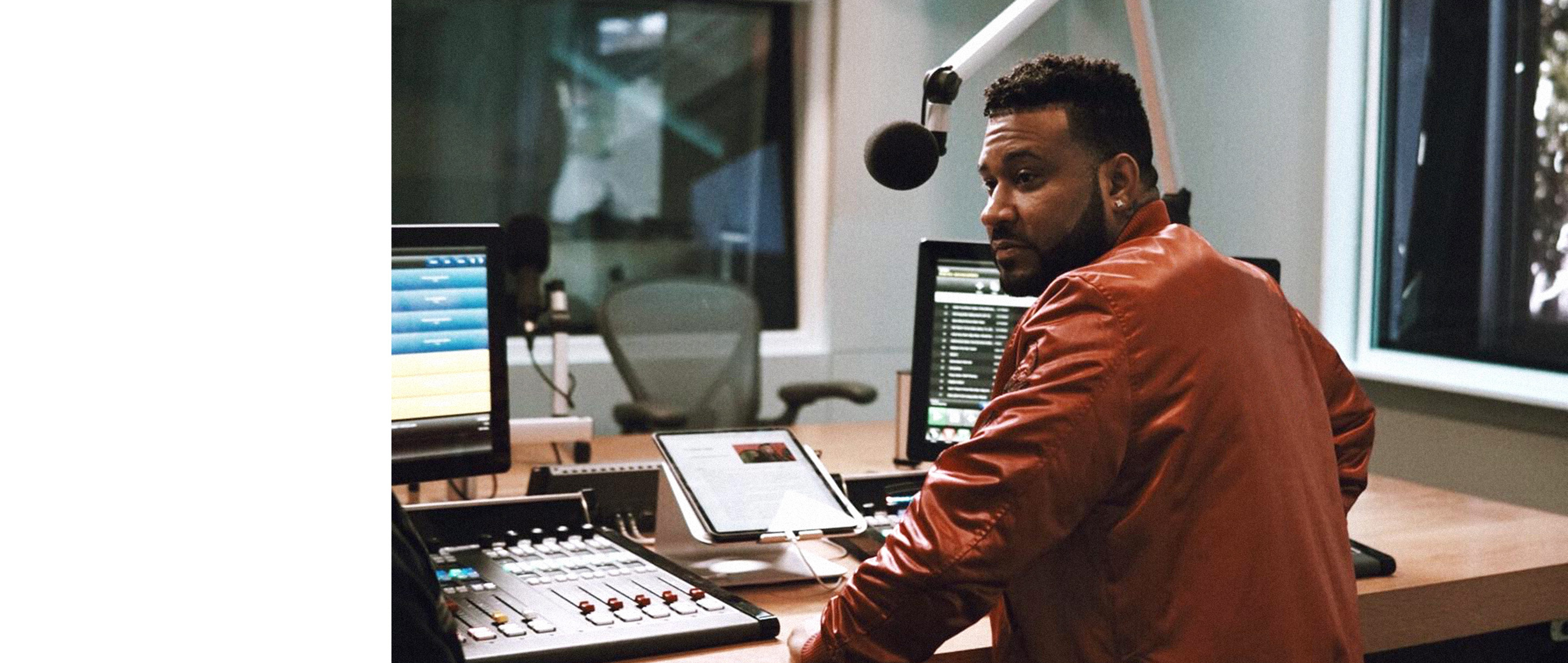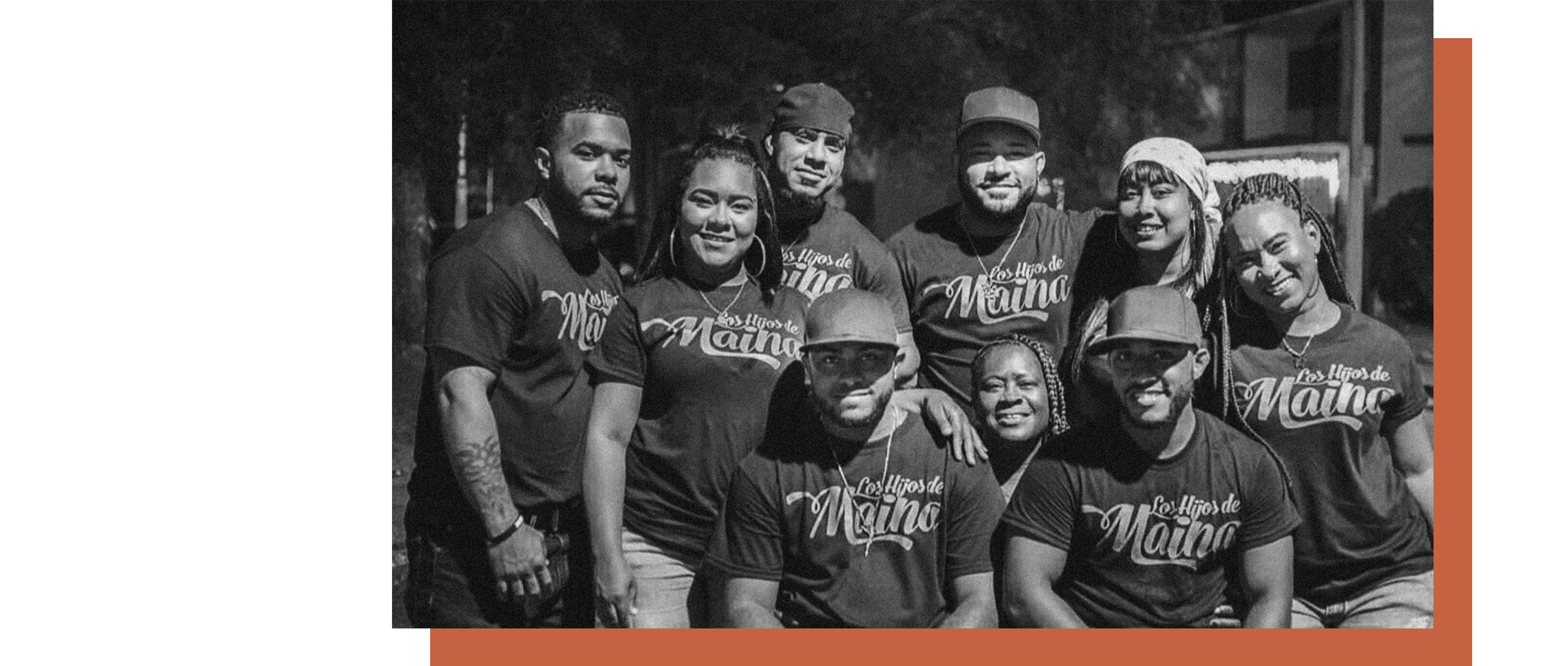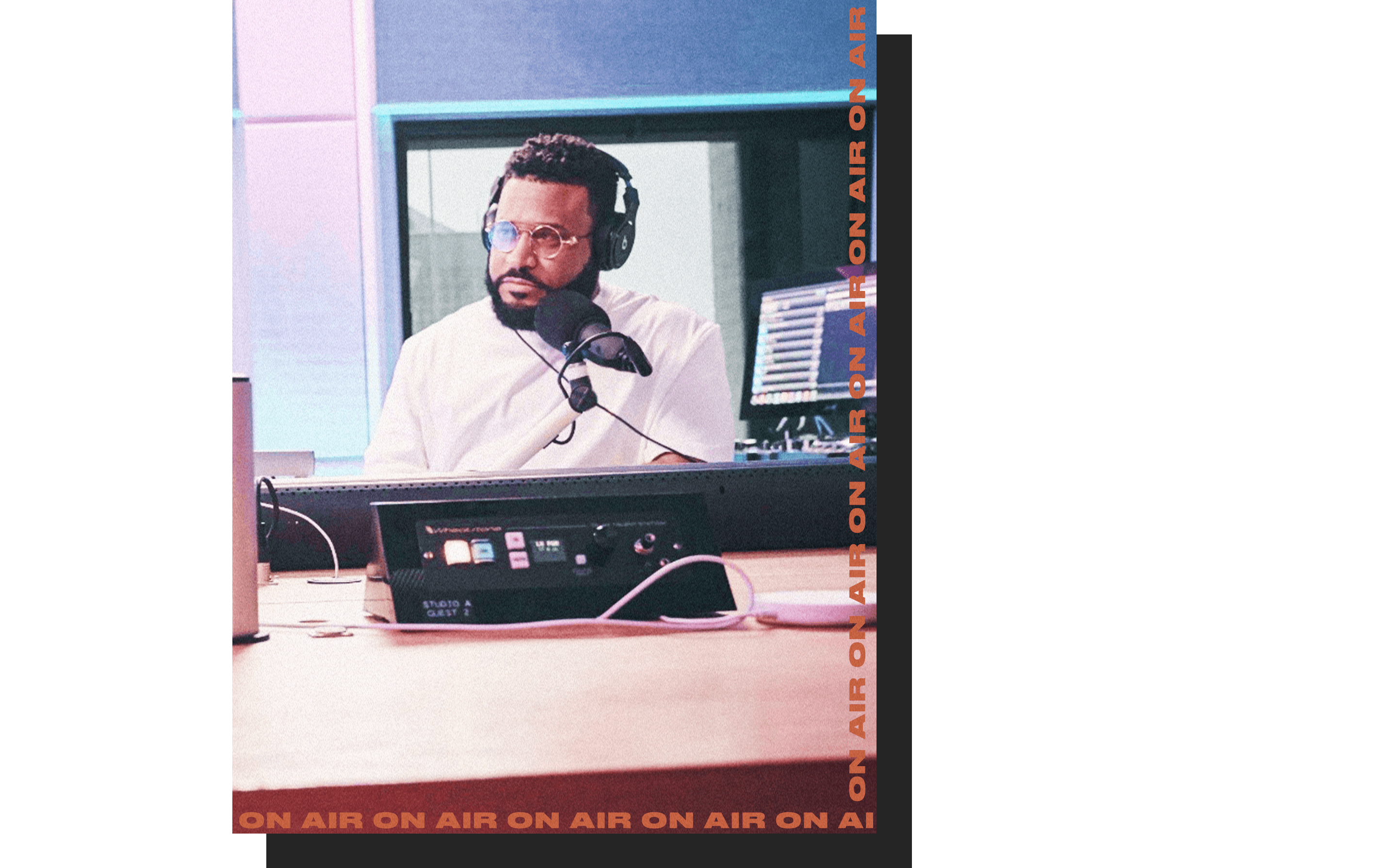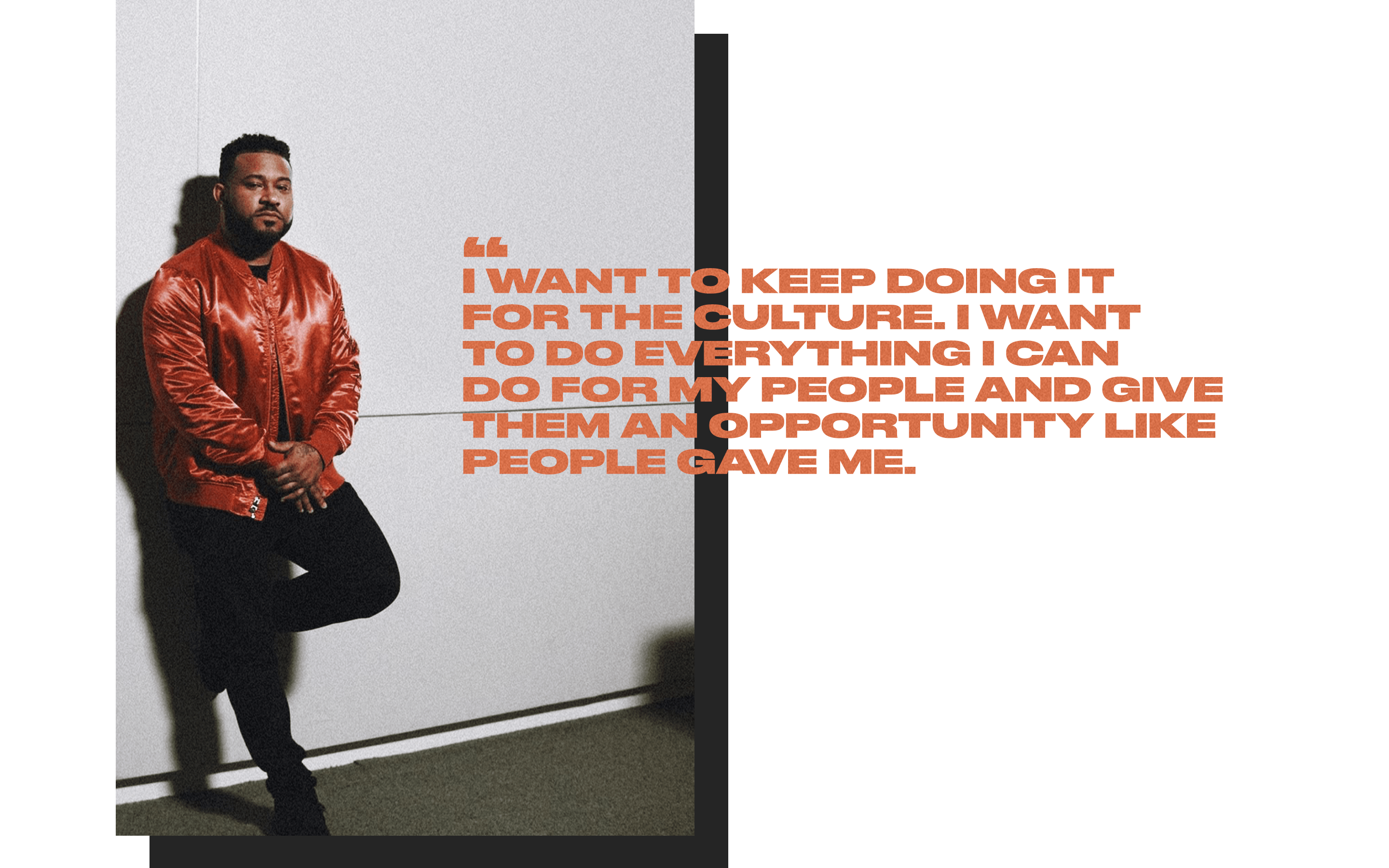On The Air
Protecting and uplifting Latin music with El Guru

The Apple Music “La Fórmula” host details his role as a tastemaker and how he’s pushing the Latin music scene forward.
El Guru takes this afternoon video call from the luxury of a room lit only by blue and purple fluorescents. Most notably in his backdrop are a set of production speakers and a pillow with an animated portrait of him rocking a crown fit for a king.
In a way, El Guru is a king in the Latin Trap/Reggaetón scene. But you won’t catch him on stage rapping in front of sold out crowds or going triple platinum — he prefers to operate behind the scenes.
In this Q+A, the artist-turned-media-personality-turned-radio-host discusses his place in the game, the importance of protecting the culture, and “La Fórmula.”
The Apple Music “La Fórmula” host details his role as a tastemaker and how he’s pushing the Latin music scene forward.
El Guru takes this afternoon video call from the luxury of a room lit only by blue and purple fluorescents. Most notably in his backdrop are a set of production speakers and a pillow with an animated portrait of him rocking a crown fit for a king.
In a way, El Guru is a king in the Latin Trap/Reggaetón scene. But you won’t catch him on stage rapping in front of sold out crowds or going triple platinum — he prefers to operate behind the scenes.
In this Q+A, the artist-turned-media-personality-turned-radio-host discusses his place in the game, the importance of protecting the culture, and “La Fórmula.”
The Apple Music “La Fórmula” host details his role as a tastemaker and how he’s pushing the Latin music scene forward.
El Guru takes this afternoon video call from the luxury of a room lit only by blue and purple fluorescents. Most notably in his backdrop are a set of production speakers and a pillow with an animated portrait of him rocking a crown fit for a king.
In a way, El Guru is a king in the Latin Trap/Reggaetón scene. But you won’t catch him on stage rapping in front of sold out crowds or going triple platinum — he prefers to operate behind the scenes.
In this Q+A, the artist-turned-media-personality-turned-radio-host discusses his place in the game, the importance of protecting the culture, and “La Fórmula.”
So, before you were a media personality and a tastemaker, you were actually a rapper yourself. How did you get to where you are today, and what caused you to change your career path?
So, I’m from “El Caserío,” the projects of Puerto Rico. I’m the second of eight brothers with the same mom, same dad. My dad died when I was 12, so my mom had to raise 8 kids by herself. I’m a dad now, so I know how stressful it is having one kid — imagine having eight.
El Caserío was this place where there was no future. So we were tired, man. Just tired of being there.
One of my brothers and I came here to the United States in 2007 because somebody was gonna sign us to a rap deal. When we got to United States to sign the deal, we realized they wanted to change everything that we wanted to do as rappers. I was like, “Nah, man.” So I started doing stuff myself. Graphic design, music videos and editing — everything. I realized that I liked doing the stuff behind the scenes.
So, before you were a media personality and a tastemaker, you were actually a rapper yourself. How did you get to where you are today, and what caused you to change your career path?
So, I’m from “El Caserío,” the projects of Puerto Rico. I’m the second of eight brothers with the same mom, same dad. My dad died when I was 12, so my mom had to raise 8 kids by herself. I’m a dad now, so I know how stressful it is having one kid — imagine having eight.
El Caserío was this place where there was no future. So we were tired, man. Just tired of being there.
One of my brothers and I came here to the United States in 2007 because somebody was gonna sign us to a rap deal. When we got to United States to sign the deal, we realized they wanted to change everything that we wanted to do as rappers. I was like, “Nah, man.” So I started doing stuff myself. Graphic design, music videos and editing — everything. I realized that I liked doing the stuff behind the scenes.
So, before you were a media personality and a tastemaker, you were actually a rapper yourself. How did you get to where you are today, and what caused you to change your career path?
So, I’m from “El Caserío,” the projects of Puerto Rico. I’m the second of eight brothers with the same mom, same dad. My dad died when I was 12, so my mom had to raise 8 kids by herself. I’m a dad now, so I know how stressful it is having one kid — imagine having eight.
El Caserío was this place where there was no future. So we were tired, man. Just tired of being there.
One of my brothers and I came here to the United States in 2007 because somebody was gonna sign us to a rap deal. When we got to United States to sign the deal, we realized they wanted to change everything that we wanted to do as rappers. I was like, “Nah, man.” So I started doing stuff myself. Graphic design, music videos and editing — everything. I realized that I liked doing the stuff behind the scenes.

I had the ability to see who’s good and who’s not, to show people who’s the next big thing in Reggaetón and Latin Trap. I felt like that was my power.
I had the ability to see who’s good and who’s not, to show people who’s the next big thing in Reggaetón and Latin Trap. I felt like that was my power.
I had the ability to see who’s good and who’s not, to show people who’s the next big thing in Reggaetón and Latin Trap. I felt like that was my power.
So one day in 2012, I told my brother, “You know what? People are into Reggaetón, man. We need a platform that we can dedicate to these artists.” So that’s when I created my website, “Rapetón.” I didn’t want to rap anymore, I dedicated myself to this platform. I had the ability to see who’s good and who’s not, to show people who’s the next big thing in Reggaetón and Latin Trap. I felt like that was my power.
So one day in 2012, I told my brother, “You know what? People are into Reggaetón, man. We need a platform that we can dedicate to these artists.” So that’s when I created my website, “Rapetón.” I didn’t want to rap anymore, I dedicated myself to this platform. I had the ability to see who’s good and who’s not, to show people who’s the next big thing in Reggaetón and Latin Trap. I felt like that was my power.
So one day in 2012, I told my brother, “You know what? People are into Reggaetón, man. We need a platform that we can dedicate to these artists.” So that’s when I created my website, “Rapetón.” I didn’t want to rap anymore, I dedicated myself to this platform. I had the ability to see who’s good and who’s not, to show people who’s the next big thing in Reggaetón and Latin Trap. I felt like that was my power.
Right. So how did you get to that point where people started to respect your thoughts and your ability to forecast who’s gonna be hot?
I think it was because I was so real with my opinions. I was trying to make a point, you know? “Yo, listen to this. These are the next ones now. You guys are the OGs and you guys don’t want to like it — but this is what’s going to happen now,” and I made my point. It started to be like “If Guru said you’re the next one … you’re the next one.” That’s what people say now. But it took time and a love of the culture. People can see when you have passion and love for this.
Right. So how did you get to that point where people started to respect your thoughts and your ability to forecast who’s gonna be hot?
I think it was because I was so real with my opinions. I was trying to make a point, you know? “Yo, listen to this. These are the next ones now. You guys are the OGs and you guys don’t want to like it — but this is what’s going to happen now,” and I made my point. It started to be like “If Guru said you’re the next one … you’re the next one.” That’s what people say now. But it took time and a love of the culture. People can see when you have passion and love for this.
Right. So how did you get to that point where people started to respect your thoughts and your ability to forecast who’s gonna be hot?
I think it was because I was so real with my opinions. I was trying to make a point, you know? “Yo, listen to this. These are the next ones now. You guys are the OGs and you guys don’t want to like it — but this is what’s going to happen now,” and I made my point. It started to be like “If Guru said you’re the next one … you’re the next one.” That’s what people say now. But it took time and a love of the culture. People can see when you have passion and love for this.
It’s interesting that you started out as an artist. When we think of careers in entertainment we only think of the stars in the spotlight — but there are so many opportunities behind the scenes. Do you wish more young creative types knew about these roles?
Yeah! We need more people like me and you behind the music. Reggaetón is becoming so popular right now and these big companies are signing kids that are starting from the hood. But then the marketing person or manager is just a guy that was never from the hood. They don’t know what we like — they don’t know none of that. People need to see people like me so they can say, “Oh, I can be a star behind the scenes too. I don’t have to be in front of the cameras.” It’s not only the guy with the bling-bling, we need more role models behind the scenes.
It’s interesting that you started out as an artist. When we think of careers in entertainment we only think of the stars in the spotlight — but there are so many opportunities behind the scenes. Do you wish more young creative types knew about these roles?
Yeah! We need more people like me and you behind the music. Reggaetón is becoming so popular right now and these big companies are signing kids that are starting from the hood. But then the marketing person or manager is just a guy that was never from the hood. They don’t know what we like — they don’t know none of that. People need to see people like me so they can say, “Oh, I can be a star behind the scenes too. I don’t have to be in front of the cameras.” It’s not only the guy with the bling-bling, we need more role models behind the scenes.
It’s interesting that you started out as an artist. When we think of careers in entertainment we only think of the stars in the spotlight — but there are so many opportunities behind the scenes. Do you wish more young creative types knew about these roles?
Yeah! We need more people like me and you behind the music. Reggaetón is becoming so popular right now and these big companies are signing kids that are starting from the hood. But then the marketing person or manager is just a guy that was never from the hood. They don’t know what we like — they don’t know none of that. People need to see people like me so they can say, “Oh, I can be a star behind the scenes too. I don’t have to be in front of the cameras.” It’s not only the guy with the bling-bling, we need more role models behind the scenes.

These big companies are signing kids that are starting from the hood. But then the marketing person or manager is just a guy that was never from the hood. They don’t know what we like — they don’t know none of that.
These big companies are signing kids that are starting from the hood. But then the marketing person or manager is just a guy that was never from the hood. They don’t know what we like — they don’t know none of that.
These big companies are signing kids that are starting from the hood. But then the marketing person or manager is just a guy that was never from the hood. They don’t know what we like — they don’t know none of that.
Completely. You brought up an interesting point on how Reggaetón is getting so big now, that you’re having people from outside the culture serving as the liaisons and representatives deciding where the music goes. Are you worried about these outside forces?
Yeah. We can’t let people that don’t know about our culture control what we’re gonna say, what we have to rap about. “No, don’t talk about this, don’t talk about that.” What do you mean, “don’t talk about this, don’t talk about that?” That’s what they want to talk about because that’s what they see. Culture vultures, you know?
Completely. You brought up an interesting point on how Reggaetón is getting so big now, that you’re having people from outside the culture serving as the liaisons and representatives deciding where the music goes. Are you worried about these outside forces?
Yeah. We can’t let people that don’t know about our culture control what we’re gonna say, what we have to rap about. “No, don’t talk about this, don’t talk about that.” What do you mean, “don’t talk about this, don’t talk about that?” That’s what they want to talk about because that’s what they see. Culture vultures, you know?
Completely. You brought up an interesting point on how Reggaetón is getting so big now, that you’re having people from outside the culture serving as the liaisons and representatives deciding where the music goes. Are you worried about these outside forces?
Yeah. We can’t let people that don’t know about our culture control what we’re gonna say, what we have to rap about. “No, don’t talk about this, don’t talk about that.” What do you mean, “don’t talk about this, don’t talk about that?” That’s what they want to talk about because that’s what they see. Culture vultures, you know?
It’s not just about protecting the music, it’s about protecting your culture as a whole.
Exactly. Yeah. That’s what it is, protecting our stuff, you know? Taking creative control. We have to have people in power. Role models that can teach this new generation.
It’s not just about protecting the music, it’s about protecting your culture as a whole.
Exactly. Yeah. That’s what it is, protecting our stuff, you know? Taking creative control. We have to have people in power. Role models that can teach this new generation.
It’s not just about protecting the music, it’s about protecting your culture as a whole.
Exactly. Yeah. That’s what it is, protecting our stuff, you know? Taking creative control. We have to have people in power. Role models that can teach this new generation.
Tell us a little bit about your Apple Music radio show La Fórmula.
La Fórmula is dancehall, Reggaetón, rap, Latin Trap, drill. Whatever they’re doing in the moment, that’s La Fórmula. It’s a mix of everything.
This Apple Music show is a huge opportunity. Apple could get anyone, but they contacted me and it’s such a blessing, man. A fews years ago, I was listening to music on an iPod when I was working as a maintenance guy. I never could’ve thought, “Yo, in the future, they’re gonna make something called Apple Music and you’re gonna be a host.”
Tell us a little bit about your Apple Music radio show La Fórmula.
La Fórmula is dancehall, Reggaetón, rap, Latin Trap, drill. Whatever they’re doing in the moment, that’s La Fórmula. It’s a mix of everything.
This Apple Music show is a huge opportunity. Apple could get anyone, but they contacted me and it’s such a blessing, man. A fews years ago, I was listening to music on an iPod when I was working as a maintenance guy. I never could’ve thought, “Yo, in the future, they’re gonna make something called Apple Music and you’re gonna be a host.”
Tell us a little bit about your Apple Music radio show La Fórmula.
La Fórmula is dancehall, Reggaetón, rap, Latin Trap, drill. Whatever they’re doing in the moment, that’s La Fórmula. It’s a mix of everything.
This Apple Music show is a huge opportunity. Apple could get anyone, but they contacted me and it’s such a blessing, man. A fews years ago, I was listening to music on an iPod when I was working as a maintenance guy. I never could’ve thought, “Yo, in the future, they’re gonna make something called Apple Music and you’re gonna be a host.”
Crazy how life works out. So why do you think that intersection between Latin music genres and hip-hop is so rich?
We came from the same place, just different countries. The projects in the United States are no different from the projects in Puerto Rico. Puerto Ricans were there in the beginning of hip-hop in the Bronx. You can feel it — you listen to a music and you know the music is part of us. Reggaetón, rap, it came from the same genes.
Crazy how life works out. So why do you think that intersection between Latin music genres and hip-hop is so rich?
We came from the same place, just different countries. The projects in the United States are no different from the projects in Puerto Rico. Puerto Ricans were there in the beginning of hip-hop in the Bronx. You can feel it — you listen to a music and you know the music is part of us. Reggaetón, rap, it came from the same genes.
Crazy how life works out. So why do you think that intersection between Latin music genres and hip-hop is so rich?
We came from the same place, just different countries. The projects in the United States are no different from the projects in Puerto Rico. Puerto Ricans were there in the beginning of hip-hop in the Bronx. You can feel it — you listen to a music and you know the music is part of us. Reggaetón, rap, it came from the same genes.

This month is Hispanic Heritage Month. What do you think it will take for this to be a more widely celebrated month in America?
I think it’s like the same thing I was saying with the music. It’s having people in power. People that are really for the culture in power. It’s gonna take time; people need to understand we are not a minority anymore, man. We are a majority.
This month is Hispanic Heritage Month. What do you think it will take for this to be a more widely celebrated month in America?
I think it’s like the same thing I was saying with the music. It’s having people in power. People that are really for the culture in power. It’s gonna take time; people need to understand we are not a minority anymore, man. We are a majority.
This month is Hispanic Heritage Month. What do you think it will take for this to be a more widely celebrated month in America?
I think it’s like the same thing I was saying with the music. It’s having people in power. People that are really for the culture in power. It’s gonna take time; people need to understand we are not a minority anymore, man. We are a majority.
No doubt. You hold a really special place in the culture. You’re kind of like an ambassador, a gatekeeper for this culture.
The gatekeeper thing … I always say “Damn, I can close the doors to somebody or open them,” you know? But I only want to open doors.
I want to keep doing it for the culture. I want to do everything I can do for my people and give them an opportunity like people gave me.
No doubt. You hold a really special place in the culture. You’re kind of like an ambassador, a gatekeeper for this culture.
The gatekeeper thing … I always say “Damn, I can close the doors to somebody or open them,” you know? But I only want to open doors.
I want to keep doing it for the culture. I want to do everything I can do for my people and give them an opportunity like people gave me.
No doubt. You hold a really special place in the culture. You’re kind of like an ambassador, a gatekeeper for this culture.
The gatekeeper thing … I always say “Damn, I can close the doors to somebody or open them,” you know? But I only want to open doors.
I want to keep doing it for the culture. I want to do everything I can do for my people and give them an opportunity like people gave me.
